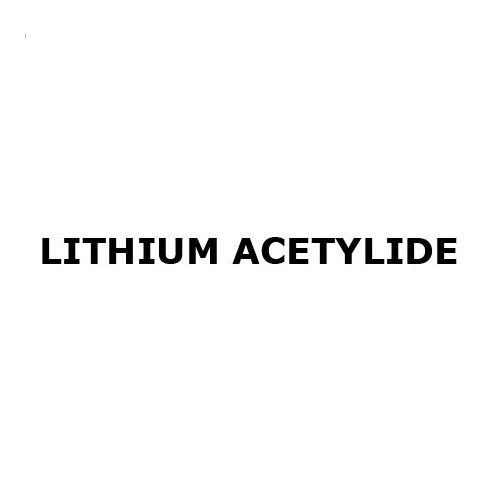Product Description
Our firm is embraced to fulfill the specific demands of clients by manufacturing exporting and supplying Lithium Acetylide. The provided chemical compound finds wide applications in sanitation of pools and spa all around the globe owing to its disinfectant property. The offered chemical is formulated by our adept professionals using superlative quality basic compounds and pioneering techniques in line with international quality standards. Also our quality examiners test this chemical on various safety parameters to ensure its safe use. Furthermore, we are offering it to the clients in different packaging options at marginal prices
Lithium Acetylide Properties:
1. CAS No: 70277-75-7
2. Molecular Formula: C2HLi
3. Molecular Weight: 31.9709 g/mol
4. Form: Powder
Lithium Acetylide Applications:
1. Synthetic Chemistry: Lithium acetylide is commonly used as a strong base in organic synthesis reactions. It can deprotonate various acidic compounds, facilitating the formation of new carbon-carbon bonds. This property makes it valuable in the synthesis of complex organic molecules.
2. Alkyne Chemistry: Lithium acetylide reacts readily with alkyl halides to form alkynes, a process known as dehydrohalogenation. This reaction is often employed in the preparation of alkynes, which are versatile building blocks in organic synthesis.
3. Dehydration Reactions: Lithium acetylide can undergo dehydration reactions to form acetylene gas (C2H2). This process is important in industrial settings where acetylene is used as a precursor in the synthesis of various chemicals, including vinyl compounds and plastics.
4. Coordination Chemistry: Lithium acetylide can coordinate with transition metal ions to form organometallic complexes. These complexes have applications in catalysis, particularly in cross-coupling reactions and polymerization processes.
5. As a Reagent in Polymer Chemistry: Lithium acetylide can be utilized as a reagent in the polymerization of certain monomers, contributing to the synthesis of polyacetylene and other polymeric materials with unique electronic properties.
6. Research in Battery Technology: Lithium acetylide has been studied as a potential material for lithium-ion battery electrolytes and electrodes. Research in this area aims to improve battery performance, stability, and safety.
7. Pyrotechnics: Lithium acetylide has been used in pyrotechnic compositions, particularly in fireworks and signal flares, where it serves as a source of acetylene gas, contributing to the colorful displays and bright lights.
8. Research in Energy Storage: Lithium acetylide and its derivatives have been investigated for their potential applications in energy storage devices, such as supercapacitors and lithium-air batteries, due to their high energy density and electrochemical properties.
Lithium Acetylide FAQ:
Q. Is lithium acetylide hazardous?
Ans: Yes, lithium acetylide is hazardous due to its reactivity. It can react violently with water, acids, and oxidizing agents, potentially leading to fire or explosion. It should be handled with care, preferably under inert atmosphere and with appropriate safety precautions.
Q. How is lithium acetylide synthesized?
Ans: Lithium acetylide can be prepared by reacting acetylene gas with lithium metal or by treating lithium carbide with a suitable solvent. The reaction typically occurs under anhydrous conditions to prevent moisture from interfering with the process.
Q. What precautions should be taken when working with lithium acetylide?
Ans: When working with lithium acetylide, it is important to handle it in a well-ventilated area, away from moisture and sources of ignition. Protective equipment such as gloves, goggles, and lab coats should be worn. Additionally, reactions involving lithium acetylide should be carried out under inert atmosphere (e.g., nitrogen or argon) to minimize the risk of unwanted side reactions.
Q. Are there any alternative compounds to lithium acetylide?
Ans: There are other strong bases and reagents available for similar applications, such as sodium amide (NaNH2) and butyllithium (BuLi). However, the choice of reagent depends on the specific requirements of the reaction and the desired outcome.
Q. Can lithium acetylide be stored for long periods?
Ans: Due to its reactivity and sensitivity to moisture and air, lithium acetylide is not typically stored for long periods. It is best prepared and used immediately or stored under anhydrous conditions in an inert atmosphere to minimize degradation and hazards.



